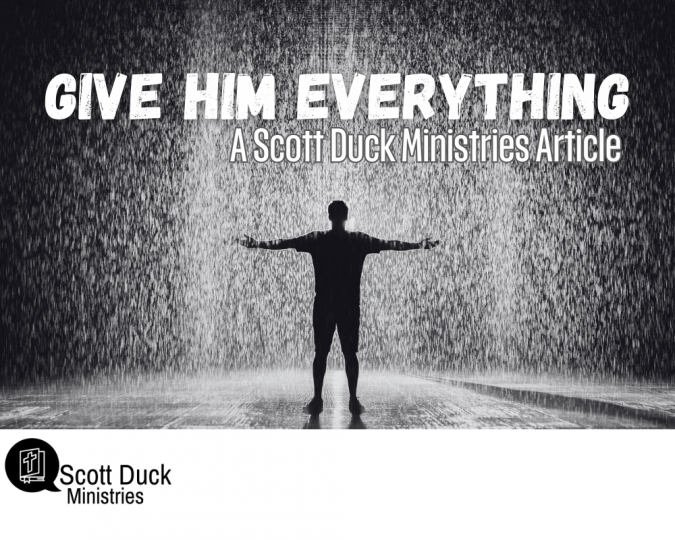
Do you ever think of the Christian life as a life of sacrifice? As Christians, when we think of sacrifice, we tend to think of the sacrifice that Jesus made on our behalf, and rightly so, but there is sacrifice that He demands of us as well. Concerning this, I often think of the story of Abraham and Isaac. I have recently both preached and written about the subject of Christian sacrifice from this prospective.
See this article: http://www.scottduck.com/he-was-willing/
I would like to talk to you about another story that embodies this idea of sacrifice. I would like to talk to you about the story, from 1 Kings 17 and 18, about the three year drought that God inflicted on Israel and the lifting of the drought. This story is relative to us, as Christians, as we live our day to day lives, and perhaps in ways that many of us may not have thought about. I would like to share my thoughts with you concerning this.
I would encourage you to read 1 Kings 17 and 18 but, in short, here is the context. God had inflicted a drought on Israel because they had turned from Him and begun to worship Baal, a pagan false god. After three years, working at the Lord’s behest, Elijah sought to lift the drought. Elijah told the prophets of Baal to prepare a bull as an offering to Baal and he, Elijah, would prepare a similar offering to the Lord. Then, Elijah said “you call on the name of your gods, and I will call on the name of the Lord; and the God who answers by fire, He is God”.
The profits of Baal called on their god all day and, of course, nothing happened.
Then, before he began to call on the Lord, Elijah told them to pore water on the offering to the Lord. They did. He then asked them to do it a second and third time. He had also dug a trench around the alter and they pored so much water on the offering that it ran down and filled the trench. There is a significance to all this that many of us may have not considered before. I have heard it said that Elijah was wetting the offering before he asked the Lord to set it on fire just to make it harder and further glorify God. I think that is certainly a valid point but I think there is more to it than just that.
Let’s talk about the water. How much water are we talking about here?
First of all, it was enough to drench an adult bull and the wood required to burn said bull. How much water does that take? I don’t know, exactly, as this is a task I have never undertaken, but I would think a lot. Bulls can easily way more than two thousand pounds. It would take a lot of wood to keep a fire going of the size and intensity needed to consume such an animal. Let’s say ten gallons. I think that it would take at least that much. Remember, they drenched it three times, so that’s 30 gallons.
Then, there’s the trench around the alter, which was filled with water. We are told that the trench was large enough to hold two seahs of seed. How much is that? It’s hard to come to a definitive conclusion concerning this but it looks like, in terms of our modern measures of volume, this would be roughly equivalent to three and a half gallons. There’s more to consider though. Remember, they were in a three year long drought, as in not one drop of rain for three years. Have you ever pored water on very dry soil? What happens to it? It is quickly absorbed. I suspect that the trench was filled each of the three times that they drenched the bull and the wood, before the soil was saturated enough for the water to remain standing within the trench. So, let’s call it ten gallons for the trench.
It looks like we’re talking about at least 40 gallons. This is a very rough approximation, and it may be generous to even call it an approximation, but we don’t need to know the exact amount and I think it is very reasonable to assume that it would have been at least that much.
Now, ask yourself something. All this water we’re talking about, where did they get it? Israel was in a drought that had lasted for three years, during which time it had not rained at all, not one drop. Crops and livestock were dying for lack of water. Where did they come up with dozens of extra gallons to pour on the sacrifice?
Some say that the water came from the Mediterranean Sea. The events we’re discussing took place on Mount Carmel, which is in fact in sight of the Mediterranean Sea, but the Mediterranean was several miles away. The profits of Baal did not finish trying to get him to bring fire until the evening (1 Kings 18:29). By that time, it would have been too late for Elijah to send people to bring water from the Mediterranean, a task that would have taken several hours at least, perhaps more than a day. The theory of the water having come from the Mediterranean Sea is simply not plausible.
There was a brook nearby but apparently it had dried up because, just prior to the events we are discussing, King Ahab and his servant, Obadiah, were looking for grass and water to keep the livestock alive (1 Kings 18:5-6). Some say that their search for water must have been successful, as demonstrated by the availability of water to poor on the sacrifice, but this is not supported by the Scriptural account. Obadiah was still searching for water when Elijah crossed his path and started these events in motion (verse 7). So, again, where did the water come from?
There is another explanation, one that may seem unlikely but is certainly plausible. The people would have had to be carrying drinking water in order to survive, as they traveled to and gathered on Mount Carmel. Some of them must have given their drinking water to pour on the sacrifice. This is the only explanation that makes sense for where the water may have come from. The people gave what, at that time, would have been their most valuable possession.
After that, Elijah prayed and God sent down fire so hot that it not only burned the offering and dried up all the water but it even burned the rocks (and rocks don’t burn!)!
After that, Elijah prayed and prayed and prayed for God to lift the drought. It took so long that he had to send someone to the top of the mountain seven times to look toward the sea for clouds and, the first six times, there were no clouds. Still, Elijah kept praying, confident that God would do what He had said that He would do. Finally, He did, as He always does.
God acted in a powerful way but He first required that the people give their most precious possession to Him and He required very long lasting and persistent prayer. When God answered Elijah’s prayers, He didn’t send a little sprinkle, He sent a deluge. Before God sent his trillions of gallons, He first required that the people give their few. This is a theme that runs throughout Scripture and throughout God’s character. He is always faithful to do what He says He will do and the power to do what gets done comes from Him but He requires us to be willing to give of ourselves as well.
Consider the story of Abraham and Isaac, as well as the sacrifice of Jesus. See the previously referenced and linked article, which I highly recommend reading, as it will help to put this one in prospective. This theme of us sacrificing what we have, which is insufficient, and then God providing the ultimate sacrifice, which is more than sufficient, is very powerful. God doesn’t need what we give Him, but we need to give it because God uses it to do something powerful within us. He uses it in order to establish a relationship with Him and to demonstrate that relationship to the world.
Have you given all you have to Him? You may think what you have isn’t enough. I assure you, it isn’t. But He wants it anyway. He yearns for it, He yearns for you. Whether you realize it or not, you yearn for Him too. There is an emptiness within all of us that only He can fill. We try to fill it with all sorts of other things but, in the end, those things still leave us empty. When you truly and fully give Him your finite life and all of the limited and broken things contained within it, He will take that and use it to forge a relationship with Him, which will give you infinite life and a joy that will fill all the empty spaces.
We are not capable of paying the price for our sin and so Christ paid it and He gave everything He had in order to do so. He requires the same of us. If we truly want to have a relationship with Him and live for Him, we have to give Him everything we have. That isn’t enough to cover our sin debt. From our side of the equation, it isn’t about covering the debt, it’s about establishing the relationship. It is Him that actually pays the price, and He is happy to do that, once we are His. We have to give Him everything, to show Him and everyone else that we are His.
If you have not already done so, I pray that you will start a conversation with Him about this, today. If you want to know how to do that, check out the “The Most Important Thing” section of this website.
